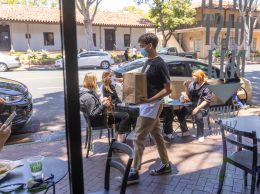By Amy Steinfeld and Alina Werth
As a result of Gov. Gavin Newsom’s stay-at-home executive order, all but “essential” businesses have closed to slow the spread of the novel coronavirus.
Cannabis dispensaries are one of a few retail operations deemed essential, along with pharmacies and grocery stores. And it’s not just dispensaries that have been deemed essential — all cannabis businesses (farmers, manufacturers, testing labs and distributors) may continue to operate while complying with state and local regulations as well as adopting social distancing and anti-congregating measures.
California is not unique in its classification of cannabis as an essential business — nearly all states with legal medical or recreational markets have classified cannabis businesses as essential services. In some places, like San Francisco and Denver, cannabis did not initially make the cut, but those decisions were quickly reversed after significant community pushback. This was before California issued its statewide shelter-in-place order. Massachusetts is the only state that has shuttered recreational (not medical) cannabis businesses despite pushback from the community.
This essential business designation is important not only for consumers and the industry, but also for jurisdictions that permit cannabis businesses because of the continued tax revenue and employment this sector provides.
In Santa Barbara County, the cannabis tax revenue for the first two quarters of this fiscal year reached $4.8 million, which is on track to surpass the $6.7 million collected in cannabis tax revenue last fiscal year. In Port Hueneme in Ventura County, cannabis tax revenue has helped the city cover its budget deficit. Keeping cannabis businesses operating as essential businesses will help maintain this important new source of tax revenue for many jurisdictions, particularly as revenue from property, sales and bed taxes takes a dramatic dive.
There has been a spike in cannabis sales in recent weeks as well. Some of this increase may be due to initial fear that access to legal cannabis would be limited in the coming months. But some of this uptick may also be a result of the increased anxiety that many people are feeling as they hunker down in their homes for an undetermined period of time. In places where cannabis has been legalized, recreational cannabis is widely used as a safer substitute for alcohol or for prescription medication to address anxiety, pain and insomnia. Others rely on medical cannabis on a daily basis and having access to an uninterrupted legal supply is critical.
The industry’s essential status will avoid some of the layoffs in the retail sector and may employ others who have recently lost jobs. As people self-isolate, they are turning increasingly to delivery services for groceries, meals and even cannabis. Such delivery jobs offer a much-needed employment bridge for those in the hospitality industry. In addition to keeping thousands employed on the Central Coast, maintaining a viable cannabis industry will also support landlords, agricultural suppliers and consultants. Further, cannabis farmers are funding numerous land use planners employed by Santa Barbara County who are continuing to review and process cannabis cultivation applications remotely during the pandemic.
San Luis Obispo and Santa Barbara counties will benefit not only from retail businesses remaining open, but also from cannabis farms that continue to support the region’s agricultural economy. The Central Coast’s perfect climate for growing cannabis coupled with its strict environmental regulations means that sun-grown cannabis is not only environmentally friendly but also provides high paying jobs to farmworkers.
Maintaining a strong legal cannabis market is also key to preventing the illicit market from expanding even further, which is inevitable in the absence of legal cannabis products combined with stretched law enforcement. Unlike other small businesses and industries, cannabis businesses are not eligible for federal stimulus support but continue to pay astronomical federal, state and local taxes, which makes it even more essential that they maintain their ability to generate revenue while providing their customers with a safe and legal source of cannabis in this unprecedented crisis.
• Amy Steinfeld is office managing partner for Brownstein Hyatt Farber Schreck’s Santa Barbara office and Alina Werth is a business development specialist at Brownstein Hyatt Farber Schreck.






 Print
Print Email
Email

















